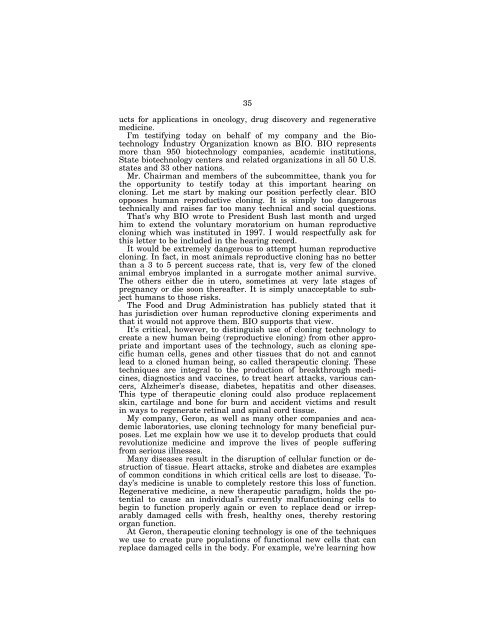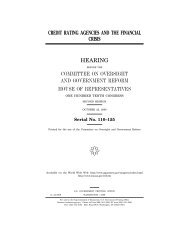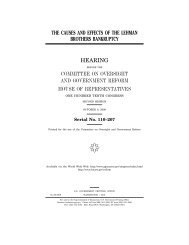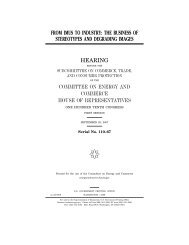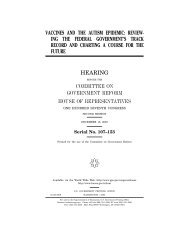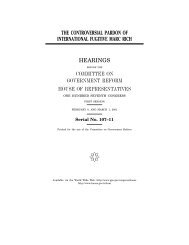34Mr. GREENWOOD. The Chair thanks the gentleman. The Chairnow calls our witnesses and thanks the first panel of witnesses andthanks all of them for their patience.I would call Dr. Thomas B. Okarma, Ph.D. and M.D. who is thePresident and CEO of Geron Corporation and is testifying on behalfof the Biotechnology Industry Organization. Also, Dr. Mark E.Westhusin, Ph.D., Associate Professor of Texas A&M University,College of Veterinary Medicine; Dr. Rudolph Jaenisch, Ph.D., Professorof Biology, Massachusetts Institute of Technology; Dr. PanosMichael Zavos, Ed.S., Ph.D., Founder, Director and ChiefAndrologist, Andrology Institute of America; and Dr. BrigitteBoisselier, Scientific Director of Clonaid. Welcome, thank you forcoming.You are aware that the committee is holding an investigativehearing and when doing so has had the practice of taking testimonyunder oath.Do you have any objections to testifying under oath? Very well.The Chair then advises you that under the rules of the Houseand the rules of the committee, you are entitled to be advised bycounsel, if you desire to be advised by counsel during your testimonytoday.I see no affirmative responses.In that case, if you would please rise and raise your right hand,I will swear you in. Do you swear that the testimony you are aboutto give is the truth, the whole truth and nothing but the truth?Thank you.[Witnesses sworn.]Witnesses may be seated in the order in which I introducedthem, we’ll begin with Dr. Okarma. For the benefit of all of the witnesses,you probably have noticed these little black boxes on thetable. When you begin your testimony, you’ll see the green light.You have 5 minutes for your testimony. You’ll get the yellow lightat 2 minutes, that’s your 2 minute warning and at the red light wewould ask you to please quickly summarize and desist.Dr. Okarma, you are recognized for 5 minutes.STATEMENTS OF THOMAS B. OKARMA, PRESIDENT AND CEO,GERON CORPORATION; MARK E. WESTHUSIN, ASSOCIATEPROFESSOR OF TEXAS A&M UNIVERSITY, COLLEGE OF VET-ERINARY MEDICINE; RUDOLPH JAENISCH, PROFESSOR OFBIOLOGY, MASSACHUSETTS INSTITUTE OF TECHNOLOGY;PANOS MICHAEL ZAVOS, FOUNDER, DIRECTOR AND CHIEFANDROLOGIST, ANDROLOGY INSTITUTE OF AMERICA; ANDBRIGITTE BOISSELIER, SCIENTIFIC DIRECTOR OF CLONAIDMr. OKARMA. Good afternoon. I am Tom Okarma, the Presidentand Chief Executive Officer of Geron Corporation in Menlo Park,California. Geron is a biopharmaceutical company focused on commercializingtherapeutic and diagnostic products for applications inoncology——Mr. GREENWOOD. Dr. Okarma, could you pull the microphone alittle closer to yourself?Mr. OKARMA. Geron is a biopharmaceutical company focused ondiscovering and commercializing therapeutic and diagnostic prod-VerDate 11-MAY-2000 07:46 May 24, 2001 Jkt 000000 PO 00000 Frm 00038 Fmt 6633 Sfmt 6602 71495.TXT HCOM2 PsN: HCOM2
35ucts for applications in oncology, drug discovery and regenerativemedicine.I’m testifying today on behalf of my company and the BiotechnologyIndustry Organization known as BIO. BIO representsmore than 950 biotechnology companies, academic institutions,State biotechnology centers and related organizations in all 50 U.S.states and 33 other nations.Mr. Chairman and members of the subcommittee, thank you forthe opportunity to testify today at this important hearing oncloning. Let me start by making our position perfectly clear. BIOopposes human reproductive cloning. It is simply too dangeroustechnically and raises far too many technical and social questions.That’s why BIO wrote to President Bush last month and urgedhim to extend the voluntary moratorium on human reproductivecloning which was instituted in 1997. I would respectfully ask forthis letter to be included in the hearing record.It would be extremely dangerous to attempt human reproductivecloning. In fact, in most animals reproductive cloning has no betterthan a 3 to 5 percent success rate, that is, very few of the clonedanimal embryos implanted in a surrogate mother animal survive.The others either die in utero, sometimes at very late stages ofpregnancy or die soon thereafter. It is simply unacceptable to subjecthumans to those risks.The Food and Drug Administration has publicly stated that ithas jurisdiction over human reproductive cloning experiments andthat it would not approve them. BIO supports that view.It’s critical, however, to distinguish use of cloning technology tocreate a new human being (reproductive cloning) from other appropriateand important uses of the technology, such as cloning specifichuman cells, genes and other tissues that do not and cannotlead to a cloned human being, so called therapeutic cloning. Thesetechniques are integral to the production of breakthrough medicines,diagnostics and vaccines, to treat heart attacks, various cancers,Alzheimer’s disease, diabetes, hepatitis and other diseases.This type of therapeutic cloning could also produce replacementskin, cartilage and bone for burn and accident victims and resultin ways to regenerate retinal and spinal cord tissue.My company, Geron, as well as many other companies and academiclaboratories, use cloning technology for many beneficial purposes.Let me explain how we use it to develop products that couldrevolutionize medicine and improve the lives of people sufferingfrom serious illnesses.Many diseases result in the disruption of cellular function or destructionof tissue. Heart attacks, stroke and diabetes are examplesof common conditions in which critical cells are lost to disease. Today’smedicine is unable to completely restore this loss of function.Regenerative medicine, a new therapeutic paradigm, holds the potentialto cause an individual’s currently malfunctioning cells tobegin to function properly again or even to replace dead or irreparablydamaged cells with fresh, healthy ones, thereby restoringorgan function.At Geron, therapeutic cloning technology is one of the techniqueswe use to create pure populations of functional new cells that canreplace damaged cells in the body. For example, we’re learning howVerDate 11-MAY-2000 07:46 May 24, 2001 Jkt 000000 PO 00000 Frm 00039 Fmt 6633 Sfmt 6602 71495.TXT HCOM2 PsN: HCOM2
- Page 1 and 2: ISSUES RAISED BY HUMAN CLONING RESE
- Page 3 and 4: C O N T E N T SPageTestimony of:Boi
- Page 5 and 6: ISSUES RAISED BY HUMAN CLONINGRESEA
- Page 7 and 8: 3Would human cloning lessen the wor
- Page 9 and 10: 5Chairman TAUZIN. Thank you, Mr. Ch
- Page 11 and 12: 7and cell therapy and beta cell dev
- Page 13: 9safety and the moral condition of
- Page 17 and 18: 13seen in the common phrase, being
- Page 20 and 21: 16a want of capacity to live were a
- Page 22 and 23: 18eight to ten weeks gestation as a
- Page 24 and 25: 20Washington v. Glucksberg ignores
- Page 26 and 27: 22tion decision. The father of ‘
- Page 28 and 29: 24been treated as ‘‘sui generis
- Page 30 and 31: 26Perhaps the three most compelling
- Page 32 and 33: 28are their genes. We know that chi
- Page 34 and 35: 30ago, Nobel Prize-winning biologis
- Page 36 and 37: 32Mr. JOHN. Thank you, Mr. Chairman
- Page 40 and 41: 36to turn undifferentiated human pl
- Page 42 and 43: 38these issues have not yet even be
- Page 44 and 45: 40really have a clue what those gen
- Page 46 and 47: 42mately 150 days of gestation and
- Page 48 and 49: 44Hill JR, Winger QA, Long CR, Loon
- Page 50 and 51: 46clones will not change a bit by t
- Page 52 and 53: 48technologies, we’re able today
- Page 54 and 55: 50from the testes of infertile men
- Page 56 and 57: 52not be taken away from people, be
- Page 58 and 59: 54a result of this declaration, I w
- Page 60 and 61: 56Too much pressure, too many expec
- Page 62 and 63: 58requires some level of scientific
- Page 64 and 65: 60an abnormal person. So I think it
- Page 66 and 67: 62to the world, back to this earthl
- Page 68 and 69: 64which is not true for cow which i
- Page 70 and 71: 66Ms. BOISSELIER. University of Hou
- Page 72 and 73: 68Ms. BOISSELIER. Soon.Ms. DEGETTE.
- Page 74 and 75: 70Mr. ZAVOS. No, no. We believe tha
- Page 76 and 77: 72cloning process. And without that
- Page 78 and 79: 74have to look at the structure of
- Page 80 and 81: 76Mr. LARGENT. So the answer is no,
- Page 82 and 83: 78that very much and you are excuse
- Page 84 and 85: 80that people have incorrectly stat
- Page 86 and 87: 82My name is Dr. Thomas Murray. I
- Page 88 and 89:
84human subjects against irresponsi
- Page 90 and 91:
86might be born as a result of this
- Page 92 and 93:
88ever, it is not unusual for the g
- Page 94 and 95:
90Mr. DEUTSCH. Because there really
- Page 96 and 97:
92Ms. ZOON. When we found out about
- Page 98 and 99:
94Mr. GREENWOOD. The time of the ge
- Page 100 and 101:
96Be that as it may I think there a
- Page 102 and 103:
98There has been progress in the cl
- Page 104 and 105:
100may find that it is a terrible e
- Page 106 and 107:
102entists tried to get this ban ov
- Page 108 and 109:
104lies in our hands. And we face a
- Page 110 and 111:
106clude Ireland, Israel, Italy, Fr
- Page 112 and 113:
108strict IVF and similar high-tech
- Page 114 and 115:
110while ‘‘clone then love’
- Page 116 and 117:
112What Cloning Is Not—The ‘‘
- Page 118 and 119:
114And the largest group of people
- Page 120 and 121:
116The last piece to the legal puzz
- Page 122 and 123:
118cloning law on both scientific f
- Page 124 and 125:
120mendous potential human safety r
- Page 126 and 127:
122age him to do this research and
- Page 128 and 129:
124I realize there have been calls
- Page 130 and 131:
126‘‘from which I have no assoc
- Page 132 and 133:
128TO HAVE CHILDREN,’’ I ask th
- Page 134 and 135:
130of ourselves as humans in our pr
- Page 136 and 137:
132Our Genetic Science Task Force c
- Page 138 and 139:
134But this was also true in occide
- Page 140 and 141:
136So we utilized good science to d
- Page 142 and 143:
138egg and so on. What you’re tal
- Page 144 and 145:
140Mr. DEUTSCH. I think that’s ac
- Page 146 and 147:
142and dad? We all did that when we
- Page 148 and 149:
144Food, Drug and Cosmetics Act or
- Page 150 and 151:
146Mister Chairman, the embryo may
- Page 152 and 153:
148The current low rate of cloning
- Page 154 and 155:
150TIME magazine’s pictorial, ‘
- Page 156 and 157:
152John A. Robertson, University of


